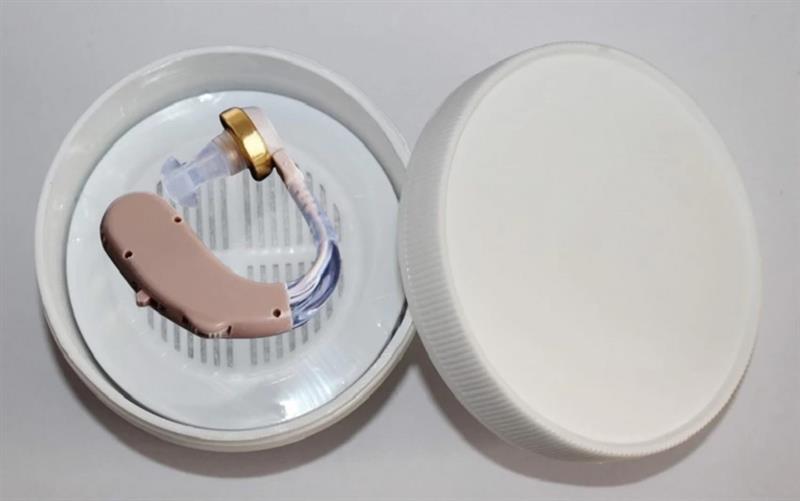
Moisture is one of the biggest risks to your hearing aids, which are a major investment in your hearing health. A simple, efficient, and reasonably priced method of preventing moisture damage to your devices and guaranteeing their continued functionality and longevity is to use a hearing aid dehumidifier. Regular use can assist maintain the durability, sound quality, and general function of your hearing aids, regardless of whether you choose an electric or desiccant-based dehumidifier.
For those who have hearing loss, hearing aids are vital tools that greatly enhance their quality of life. Moisture is one of the worst enemies of hearing aids, which are susceptible to environmental variables like any other electronic device. Sweat, humidity, or unintentional contact with water can all seriously harm hearing aids, resulting in malfunctions or a shorter device life.
Hearing aid dehumidifiers are useful in this situation. By shielding your hearing aids from moisture, these little but essential gadgets help them last longer and perform at their best. We'll go into the best practices for using hearing aid dehumidifiers, their functions, and their importance in this blog.
What Is a Hearing Aid Dehumidifier?
A specialized tool called a hearing aid dehumidifier is made to keep your hearing aids dry and functioning by removing moisture from them. There are several varieties of these dehumidifiers, ranging from basic drying kits to more sophisticated electric drying systems. All of them have the same fundamental function, which is to shield your hearing aids from the destructive effects of moisture.
Hearing Aid Dehumidifier Types
There are numerous varieties of dehumidifiers for hearing aids on the market, each with special characteristics and techniques for eliminating moisture.
1. Canister or Jar Dehumidifiers (Based on Desiccant)
These are the most basic and reasonably priced kind of dehumidifiers for hearing aids. Usually, a jar or canister is filled with desiccant beads (like silica gel) that draw moisture from the surrounding air.
- How it works: The desiccant beads pull moisture away from your hearing aids when you leave them in the jar or canister overnight. The beads will eventually change color, signaling that they need to be changed or dried.
- Pros: Low cost, simple to use, requires no electricity.
- Cons: In excessively humid conditions, desiccant beads are less effective, because they require regular replacement.
2. Electric Hearing Aid Dehumidifiers
These are more advanced dehumidifiers that use heat and sometimes UV light to remove moisture from hearing aids. They are powered by electricity and provide more thorough drying compared to desiccant-based dehumidifiers.
- How it works: You place your hearing aids in the device’s chamber, and it applies gentle heat or uses a fan to evaporate the moisture. Some models also include a UV light, which can sanitize your hearing aids by killing bacteria and germs.
- Pros: Highly effective at removing moisture, some offer additional UV sterilization, can extend hearing aid lifespan.
- Cons: More expensive, requires access to electricity.
3. Hearing Aid Drying Capsules
Drying capsules are another desiccant-based solution but are portable and disposable. They can be placed inside a small case or pouch with the hearing aids, absorbing moisture on the go.
- How it works: Like jar dehumidifiers, these capsules use desiccant material to absorb moisture. They are more portable and convenient for travel.
- Pros: Portable, convenient, inexpensive.
- Cons: Disposable, may not be as effective for long-term moisture protection.
Why a Hearing Aid Dehumidifier Is Necessary
Purchasing a dehumidifier for your hearing aids is not just convenient; it's also an investment protection measure. Moisture is one of the main reasons why expensive gadgets like hearing aids break down. The main justifications for why utilizing a dehumidifier is crucial for hearing aids are as follows:
1. Extended Life of the Device
Frequent exposure to dampness can accelerate the wear and tear of hearing aids. By lowering the chance of internal corrosion and other moisture-related damage, a dehumidifier can extend the
2. Avoid Errors
Moisture might distort the sound or short circuit your hearing aids. By preventing these problems, dehumidifiers guarantee that your hearing aids will always function at their peak efficiency.
3. Improve Sound Quality and Comfort
Dehumidifiers keep your hearing aids dry, preventing moisture buildup that could affect sound quality or make using them uncomfortable.
4. Lessen the Need for Maintenance
Moisture damage frequently necessitates expensive replacement or repairs. Regular use of a dehumidifier can lessen the chance of damage, saving you money and time on repairs.
5. Clean Your Electronic Equipment
The UV sterilizing capabilities of many electric dehumidifiers eliminate bacteria and germs that can build up on your hearing aids and result in ear infections or other health problems.
How to Make the Most of a Hearing Aid Dehumidifier
Use these basic practices to get the most out of your dehumidifier for hearing aids:
- Use Every Day: Develop the practice of putting your hearing aids in the dehumidifier each night. This guarantees that any moisture that has accumulated throughout the day is eliminated before it results in damage.
- Keep Batteries Out: Before putting your hearing aids in the dehumidifier, be sure the batteries are out. This keeps the batteries from becoming damaged and aids in the device's better drying.
- Replace Desiccants as Needed: If your dehumidifier is dependent on desiccants, monitor the color of the desiccant beads and swap them out when they lose their effectiveness.
- Choose Electric Models in Humid Environments: For improved moisture control, think about purchasing an electric dehumidifier if you are in a region with high humidity.
It's ideal to keep yourself as educated with your hearing aids and a new breakthrough in the technology. Ask your query via Book an Appointment today. For more information visit https://hearing.careinc.ca or you can call us today at (403)605-6300